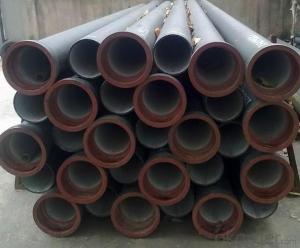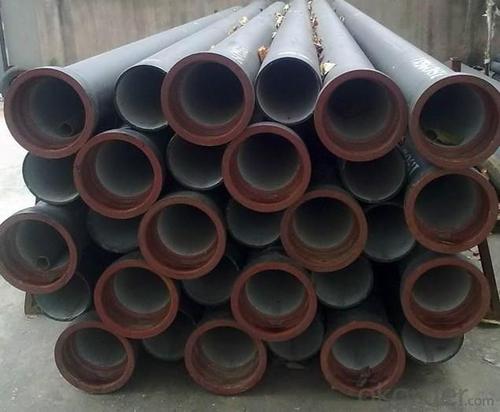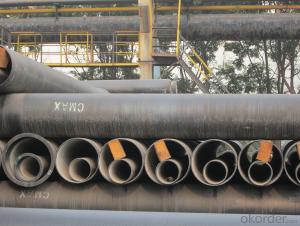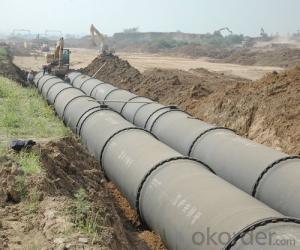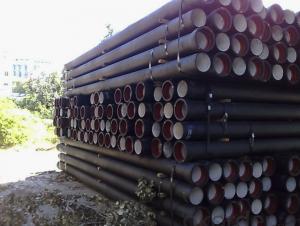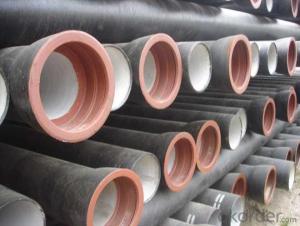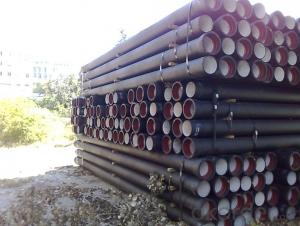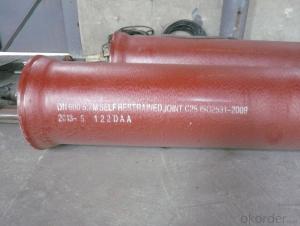Ductile Iron Pipe of China C25 DN250 EN545/EN598 On Factory Price
- Loading Port:
- China main port
- Payment Terms:
- TT or LC
- Min Order Qty:
- 25 m.t.
- Supply Capability:
- 50000 m.t./month
OKorder Service Pledge
OKorder Financial Service
You Might Also Like
1,Ductile Iron Pipe Description :
1) Pipes confirm to ISO2531,K9 class,T type joint,6m long,with inside cements lining conform to ISO4179, outside Zinc spraying(130g/m2) and bitumen coating(70μm) conform to ISO8179.
2) Pipe ends: Spigot and socket ends, with 100% SBR rubber gaskets accoding to ISO4633
3) we can do third party inspection according to customer's request.
4) Our products have been sold to many international market, such as Middle East and South East Asia and Africa.
2,Main Features of the Ductile Iron Pipe:
•High yield strength
•High tensile Strength
•High corrosion resistance
•Pressure Resistence
•Anti-corrosion
•Installation is convenient
•Satisfy the highest hygienic standards
Packing and Shipping
• standard export package(carton/wooden case/pallet)
• accept FOB,FAS,CNF,CIF door to door etc or customer designated shipping agent
Service
• Drawing: we can translate your original drawing, offer best suggestion on design
• Quality: we have full set quality control system to guarantee the best quality.
• Inspection: inspect in house, all our products must be checked 3 times before packing
Inspection
• In-house Foundry
• Third party inspection available upon requirement
Our goal
• To be your preferred partner
3,Ductile Iron Pipe Images:
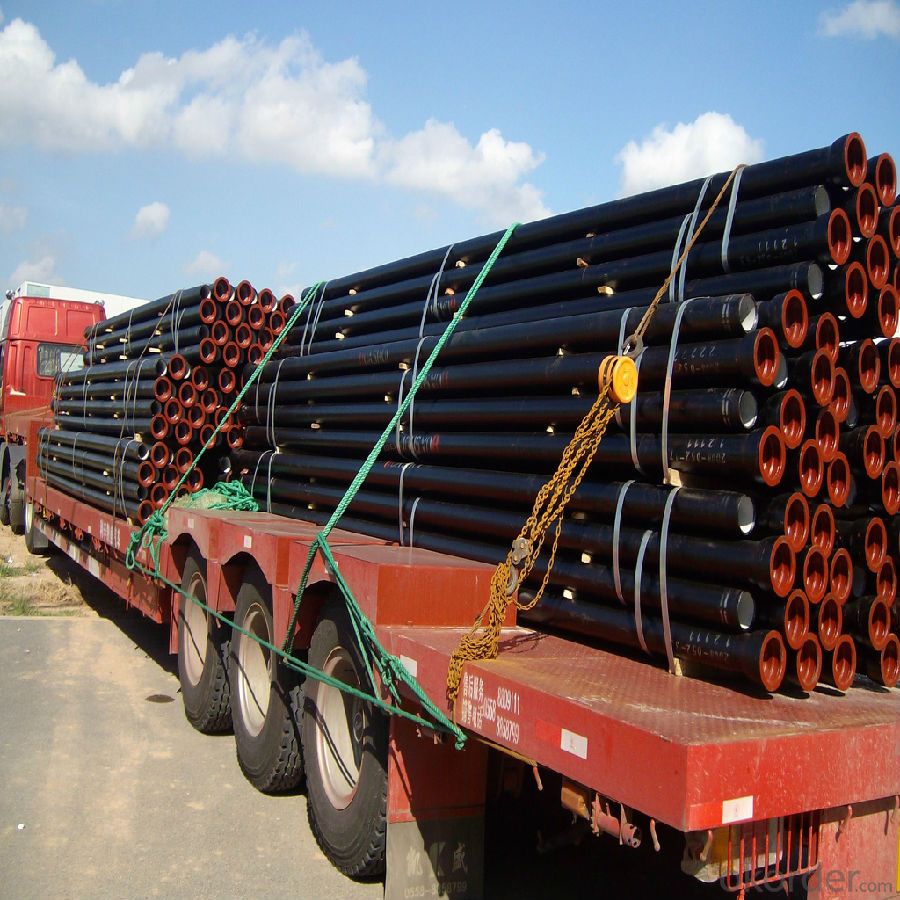
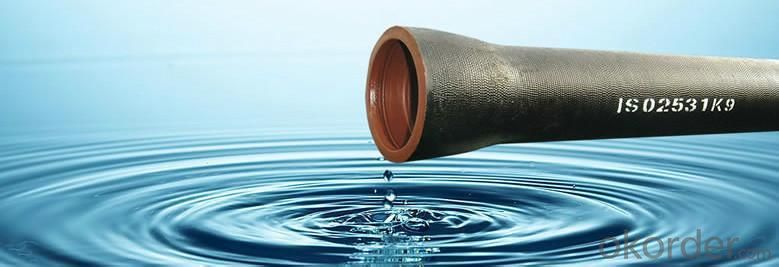
4. Ductile Iron Pipe Specification:
Surface Finishes: Bare, Oiled, Mill Varnish, Galv,FBE, FBE Dual, 3LPE, 3LPP, Coal Tar,Concrete Coating and Tape Wrap
End Finishes: Beveled, Square Cut, Threaded, hat
Additional Services: Internal Coating
Packaging: packed in bag, plastic bag, steel strip, steel wire,double wire, iron box, wooden box, tarpaulin, plastic sheeting
Inspection: MOODY SGS BV GL DNV ABS LIOYD’S
Test: X-ray, UT, magnetic particle,inspection,hydrostatic test.
Processing service: Beveling, Threading, Slotting, Cut-to length, Bends, Quench and Temper, Fabrication, Double-jointing and On-site assistance
Documentary: MTC, material certification,Origin certification, CI or PI,Test Report, export licence, handling order, B/L,insurance policy,shipping instructions, contract, packing list etc.
5.FAQ:
We have organized several common questions for our clients,may help you sincerely:
1.Q: Why would you choose ductile iron pipe rather than other pipe materials?
A:The reasons are obvious for that not only ductile iron pipe possesses the inherent strength and flexibility of ductile iron, combined with proven corrosion protection systems, but also the cost savings can be achieved from design to installation and commissioning.
2.Q:Why can you guarantee the inner of pipes can’t be corroded?
A: High alumina cement mortar lining and sulphate-resistant cement mortar lining. These two special linings are applicable to inner anti-corrosion for sewage pipes, improving resistance to erosion of the sewage components.
- Q: Are ductile iron pipes suitable for industrial water systems?
- Yes, ductile iron pipes are suitable for industrial water systems. They possess excellent strength, durability, and corrosion resistance, making them ideal for transporting water in industrial settings. Additionally, their ductility allows them to withstand high pressure and accommodate for ground movement, ensuring long-term reliability in industrial water systems.
- Q: QT400-10 nodular cast iron requires hardness of HRC47~51. Why can't quench hardness be reached?
- QT400-10 shall ensure sufficient pearlite in the casting state, at least half of the pearlite. This is done with the temperature, time, and water. But if it is big, the heart hardness will not go up.
- Q: What are the specifications of cast iron pipes?
- The nominal diameter of the continuous grey cast iron pipe is 75~1200 mm. It adopts the form of socket type or flange disk interface. It can be divided into two kinds of flexible interface and rigid interface according to function. The length of the straight pipe is 4 meters, 5 meters and 6 meters. According to the wall thickness, LA, A and B are divided into three grades. The nominal diameter of the centrifugal cast iron pipe of the sand mould is 200~1000 mm, the effective length is 5 meters and 6 meters. According to the wall thickness, it is divided into two grades: P and G. High strength, good toughness, thin tube wall, little metal consumption, and can bear higher pressure,
- Q: Are ductile iron pipes resistant to external loads?
- Yes, ductile iron pipes are highly resistant to external loads. Their inherent strength and flexibility make them capable of withstanding heavy loads and stresses from surrounding soil and traffic.
- Q: Are ductile iron pipes resistant to abrasion?
- Yes, ductile iron pipes are highly resistant to abrasion.
- Q: Does the cast iron pipe need separate corrosion protection?
- Ductile iron is characterized by its ease of decay and deformation, so if it is not a particular requirement, there is no need to do it alone
- Q: Can ductile iron pipes be used for drainage systems in airports?
- Yes, ductile iron pipes can be used for drainage systems in airports. Ductile iron pipes are known for their durability, strength, and resistance to corrosion, making them suitable for various applications, including drainage systems. They are capable of withstanding heavy loads, which is important in airports due to the constant movement of aircraft and vehicles. Ductile iron pipes are also flexible, allowing for easy installation and modification when necessary. Additionally, they have a long lifespan, reducing the need for frequent maintenance or replacement. Therefore, ductile iron pipes can be a reliable choice for drainage systems in airports, ensuring efficient water flow and preventing water accumulation, which is crucial for maintaining safe and operational airport facilities.
- Q: Are ductile iron pipes suitable for pressure sewer systems?
- Yes, ductile iron pipes are suitable for pressure sewer systems. Ductile iron pipes have been widely used in various applications, including pressure sewer systems, due to their high strength and durability. These pipes are able to withstand high pressure and provide a reliable and long-lasting solution for transporting sewage under pressure. Ductile iron pipes also have excellent corrosion resistance, which is crucial in sewer systems where they are exposed to various chemicals and contaminants. They are resistant to both internal and external corrosion, ensuring that the pipes remain intact and functional over time. Furthermore, ductile iron pipes have a smooth internal surface, which helps to minimize friction and improve the flow capacity of the sewer system. This ensures that the pipes can handle the required flow rates and prevent any blockages or backups. In addition to their strength and corrosion resistance, ductile iron pipes are also known for their ease of installation. They can be easily cut and joined using a variety of methods, making them a convenient choice for pressure sewer systems. Overall, ductile iron pipes are a suitable and reliable choice for pressure sewer systems due to their high strength, corrosion resistance, smooth internal surface, and ease of installation.
- Q: What are the recommended bedding and backfill materials for ductile iron pipe?
- To ensure proper alignment and prevent damage during installation and operation, ductile iron pipe requires a combination of granular materials such as sand, gravel, or crushed stone for bedding and backfill. Bedding involves using sand to create a level surface, distributing the load evenly and reducing stress concentration. As for backfill, it should be carefully selected to offer good compaction and drainage properties, preventing settling and potential damage. Common choices for backfill are crushed stone or gravel, which provide stability and allow for proper compaction. To ensure the long-term performance and durability of the pipe system, it is crucial to adhere to the recommendations of the pipe manufacturer and relevant industry standards when selecting bedding and backfill materials. These materials must meet specified size and quality requirements. Additionally, local regulations and soil conditions should also be considered when determining the appropriate bedding and backfill materials for ductile iron pipe installations.
- Q: Can ductile iron pipes be used in areas with high soil erosion?
- Yes, ductile iron pipes can be used in areas with high soil erosion. Ductile iron is known for its high tensile strength and durability, making it resistant to external forces such as soil erosion. It is a suitable choice for underground piping systems in such areas, providing long-term reliability and stability.
Send your message to us
Ductile Iron Pipe of China C25 DN250 EN545/EN598 On Factory Price
- Loading Port:
- China main port
- Payment Terms:
- TT or LC
- Min Order Qty:
- 25 m.t.
- Supply Capability:
- 50000 m.t./month
OKorder Service Pledge
OKorder Financial Service
Similar products
Hot products
Hot Searches
Related keywords
